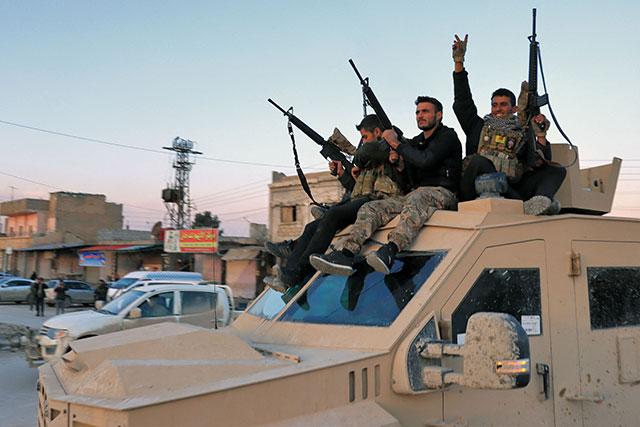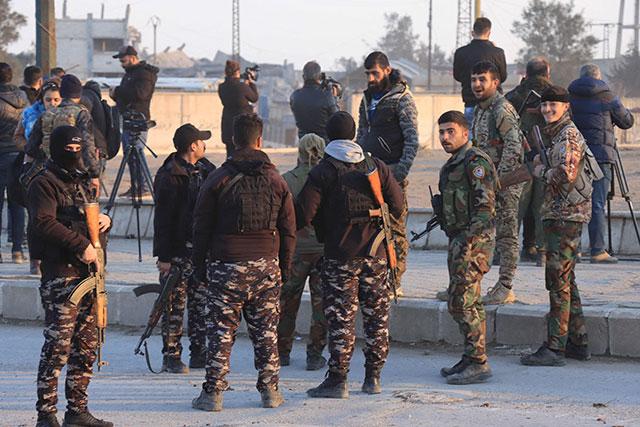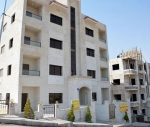You are here
Syria Kurds hunt down terrorists after prison attack
By AFP - Jan 27,2022 - Last updated at Jan 27,2022

Members of the Syrian Democratic Forces (SDF) deploy outside Ghwayran prison in Syria's northeastern city of Hasakeh on Wednesday (AFP photo)
HASAKEH, Syria — Kurdish-led forces on Thursday found dozens of terrorists holed up in a Syrian prison as they carried out mop-up operations after recapturing the facility from Daesh group terrorists. An Daesh assault on the sprawling Ghwayran prison complex near the city of Hasakeh on January 20 sparked six days of fighting, in violence that claimed more than 200 lives.
It was the most high-profile attack launched by the militants since the loss of their "caliphate" nearly three years ago.
The Kurdish-led Syrian Democratic Forces(SDF) said they had retaken full control of Ghwayran prison on Wednesday, ending battles that turned the largest city in north-eastern Syria into a war zone.
But search operations the next day found around 60-90 terrorists still holed up in one wing of the prison, the SDF said, adding that 3,500 Daesh members had so far surrendered to its forces.
"Our forces have made a call for safe surrender... and in case they did not surrender, we will deal with them firmly," it said in a statement.
Sporadic clashes broke out again on Thursday in the vicinity of the prison compound during the Kurdish mop-up operations, killing at least five terrorists, the Syrian Observatory for Human Rights said.
Hasakeh, meanwhile, entered its fourth day in lockdown with US-backed Kurdish forces blocking all entrances to the city to keep fleeing militants from crossing into other areas.
Around 45,000 people had fled their homes in Hasakeh to escape the violence, according to the United Nations, with many taking shelter in mosques or wedding halls inside the city.
'Risked our lives'
On Thursday, families gathered at a checkpoint erected at the entrance to the neighbourhood of Ghwayran, pleading with security forces to let them through, according to an AFP correspondent.
"We came to check on our house," said Abu Hamza, who was waiting in the blistering cold with his five children.
"But they turned us away because the situation is not good," he added. Nearby, two women carrying plastic bags packed with bread were also hoping to gain access to the neighbourhood where they said trapped civilians had been left without basic supplies for days.
"People have been left without bread, without water, without anything," one of the women told AFP.
"We came, and risked our lives to buy bread for the neighbourhood and we will distribute it," she said.
The Syrian Observatory for Human Rights said Kurdish forces combing areas inside the prison where proceeding with "great caution over fears of suicide bombers or landmines laid by the Daesh group".
The Britain-based war monitor said 161 Daesh terrorists, 55 Kurdish fighters and seven civilians had been killed since the start of the assault. The Kurdish authorities have insisted no inmates escaped from the compound but the observatory, which relies on sources on the ground, has said significant numbers got away.
'Broader crisis'
Ghwayran held an estimated 3,500 IS inmates, including around 700 minors, when the initial IS attack began with explosives-laden vehicles driven by suicide bombers.
"The Kurdish-led forces' recapture of the prison ends this immediate deadly ordeal, but the broader crisis involving these prisoners is far from over," Human Rights Watch warned on Wednesday.
"The US-led coalition and others involved need to quickly ensure that all prisoners, especially the wounded, ill and children, are safe and receive food, water and medical care," it added.
Prisoners who surrendered were being transferred to safer facilities as operations in Ghwayran continued, the SDF said.
Kurdish authorities say more than 50 nationalities are represented in Kurdish-run prisons holding more than 12,000 Daesh suspects.
The Kurdish administration has long warned it does not have the capacity to hold, let alone put on trial, all the Daesh fighters captured in years of operations.
The administration's foreign policy chief Abdulkarim Omar said it was up to the international community to put foreign terrorists on trial or repatriate them.
The Daesh threat is "like a fireball, it gets more dangerous and complicated with time", he told AFP on Wednesday.
The self-declared Daesh caliphate, established in 2014, once straddled large parts of Iraq and Syria.
After five years of military operations conducted by local and international forces, its last rump was eventually flushed out on the banks of the Euphrates in eastern Syria in March 2019.
Related Articles
HASAKEH, Syria — Clashes broke out on Saturday between Kurdish forces and Daesh group extremists near a Syrian prison where dozens of are st
HASAKEH, Syria — Kurdish forces on Wednesday retook full control of a prison in northeast Syria where Daesh group terrorists had been holed
QAMISHLI, Syria — The Kurdish-led Syrian Democratic Forces (SDF) said on Friday they had arrested more than 100 "terrorists" in an eight-day
















